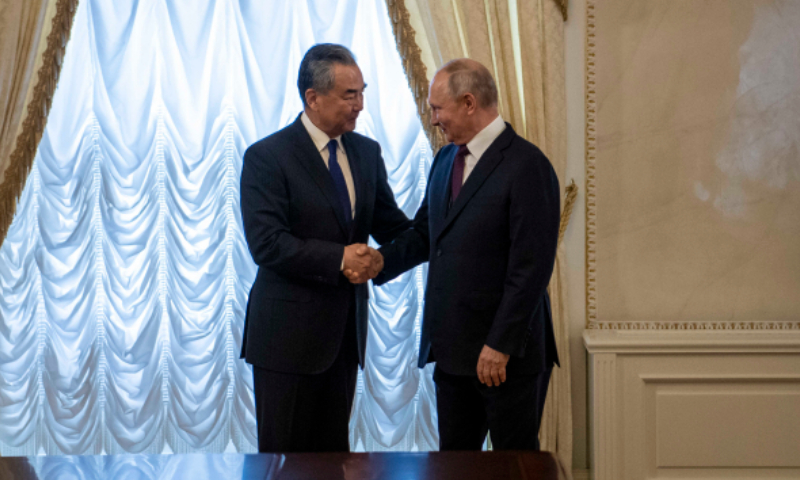Top diplomat Wang Yi wraps up Russia visit after meeting with Putin
Trip underscores stability, cooperation, independence of China-Russia relations: experts

Russian President Vladimir Putin (right) meets with Chinese top diplomat Wang Yi in Moscow on Wednesday. Photo: fmprc.gov.cn
China's top diplomat's visit to Russia underscores the stability, sustainability and independence of China-Russia relations, Chinese experts said, after Chinese Foreign Minister Wang Yi on Thursday wrapped up his four-day trip to Moscow, during which he met with Russian president and senior officials.
Wang, also a member of the Political Bureau of the Communist Party of China Central Committee, met with Russian President Vladimir Putin on Wednesday. He told Putin that China is willing to work together with Russia, based on the important consensus reached by the two heads of state, to enhance strategic mutual trust, deepen practical cooperation, and further consolidate the public and social foundation of the China-Russia friendship.
Both countries should strengthen multilateral strategic cooperation and safeguard legitimate rights and interests, making new efforts to promote a more fair and reasonable international order, Wang said.
Russia highly appreciates and supports the joint construction of the Belt and Road Initiative (BRI), and opposes distortion and smearing of the BRI. Russia is willing to strengthen the connectivity between the Eurasian Economic Union and the BRI, promoting regional integration, Putin noted.
From the beginning of this year, Russia has overcome the impact of unilateral sanctions imposed on it by the US and the West, and its economy has begun to recover and grow, with various functions operating normally, according to Putin.
"The changing world order, especially the fierce game between major powers, means the pressure to maintain the stability of the global order is increasing. In fact, the dialogue between China and Russia aims to maintain the stability of the world and regional order and not engage in bloc confrontation," Zhang Hong, an associate research fellow at the Institute of Russian, Eastern European and Central Asian Studies of the Chinese Academy of Social Sciences, told the Global Times on Thursday.
This has also created space and possibilities for China and Russia to continue expanding cooperation in the economic and trade fields, Zhang noted.
Putin has confirmed that he will travel to China next month on his first foreign trip of 2023, according to RT. Commenting on the upcoming visit, Kremlin Press Secretary Dmitry Peskov said that the groundwork for the trip was already being laid, but would not provide specific dates.
Mao Ning, the Chinese Foreign Ministry spokesperson, said on Thursday that the third Belt and Road Forum for International Cooperation will be held in October this year, and that China and BRI partners are in close communication on the event.
"We will officially release information in due course. We welcome countries and partners engaged in Belt and Road cooperation to come to Beijing, explore more possibilities for cooperation and achieve development together," Mao said.
Before his trip to Russia, Wang on Sunday held several rounds of meetings in Malta with US National Security Adviser Jake Sullivan. Experts believe that China, as a third party between the US and Russia, is helping the US and Russia to maintain information communication through its own efforts.
China, the US and Russia are inextricably linked in their concerns over the Ukraine issue, and China is playing a coordinating role between the three so that the US and Russia can understand each other's bottom lines, Cui Heng, a scholar from the China National Institute for SCO International Exchange and Judicial Cooperation, told the Global Times.
However, some Western media outlets, such as RFI, are hyping up the "China-Russia alliance theory." Experts said it is because their strategy of adding fuel to the fire, suppression and isolation has not achieved the expected results. That is why they are gradually shifting the blame for the conflict between Russia and Ukraine to others, Zhang said. The West is to blame for the shift in Europe's security order from dialogue to competition and confrontation, he noted.

